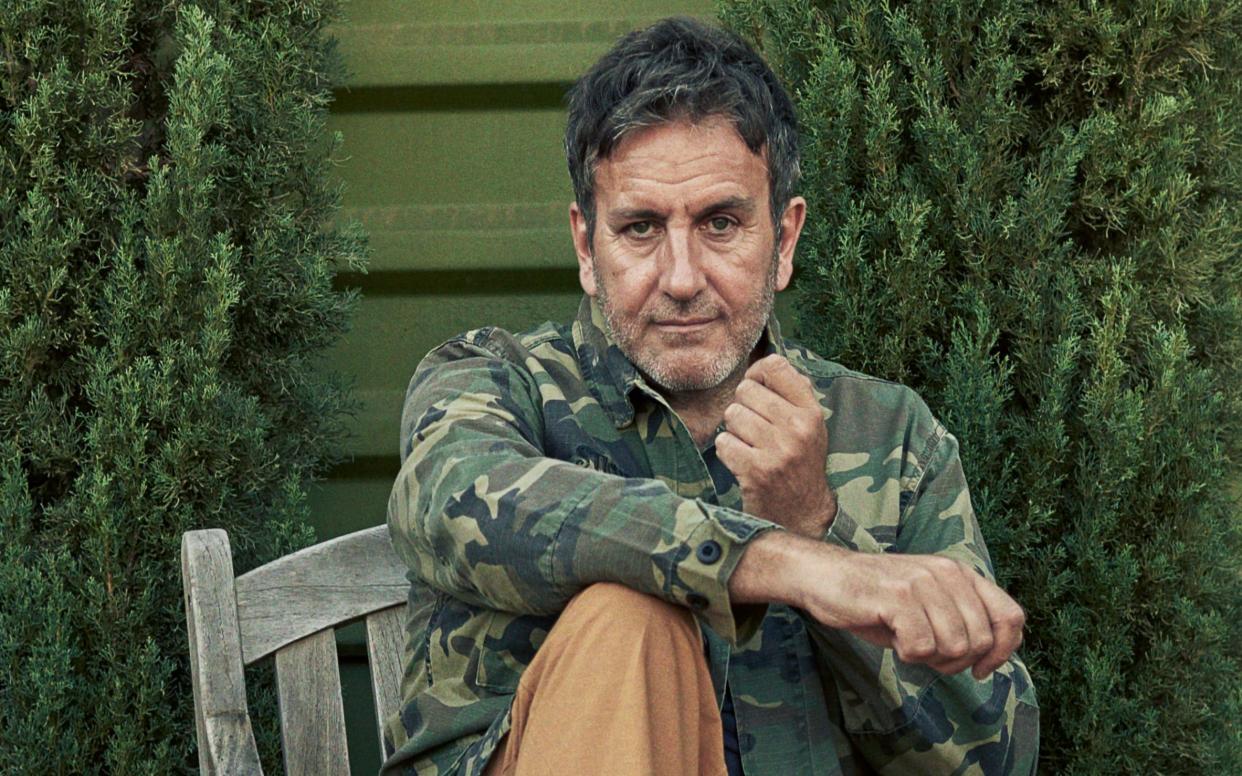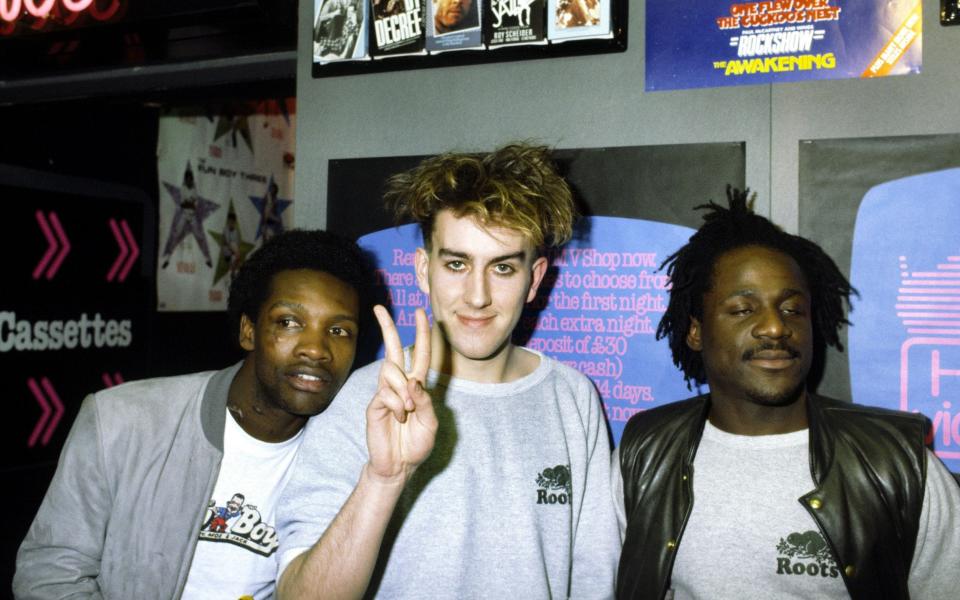Plenty of rock stars open up about mental health – but Terry Hall made skinheads cry

- Oops!Something went wrong.Please try again later.
- Oops!Something went wrong.Please try again later.
As well as being lead singer in The Specials, Terry Hall – who has died aged 63 – was a staunch campaigner around mental health issues in the music industry. As a sufferer of a bipolar disorder himself, the Coventry-born musician knew all about the highs, the lows, the burnout and the pressure that can affect artists, particularly when they hit the road for months-long tours.
Hall was equally aware of the stigma when it came to talking about mental health in general, especially among the middle-aged men who made up the bulk of The Specials’ audience. So he confronted this head-on. In recent years, Specials concerts would have stalls in the foyer where audience members could go and talk about any struggles they may have been having. These stalls were branded Never Mind the Stigma, in a nod to the Sex Pistols’ album title. The result was astonishing, says Steph Langan, the founder and chief executive of Tonic Music For Mental Health, the charity which ran the stalls and of which Hall was a patron.‘
“At Specials gigs we would have older skinhead men crying and opening up, and that was quite incredible because we were able to reach people that we wouldn’t otherwise have been able to reach,” says Langan. “A lot of fans of The Specials are men of a certain age who probably have never really opened up about their mental health before.”
So as well as breaking down barriers with his socially-inclusive 2-Tone ska revival music, Hall also broke them down when it came to one of the biggest and least understood health issues of modern times. “Terry was incredibly brave to be so open and honest about these things. He never shied away from talking to anyone about it,” says Langan, who says she and her colleagues are “devastated” at his death.
Hall would do fundraising concerts for Tonic, which was founded in 2012. He’d often head to the stalls at Specials concerts to share his stories about mental health. And he got fully behind an initiative launched by the charity in 2021 called Tonic Rider, aimed specifically at working musicians and music industry professionals. Tonic Rider offers a series of online programmes as well as peer support groups, guides to mental health, and mental health first aid training.

Again, it has pop-up stalls at concerts where it provides “mental health MOTs” to bands. Nine out of 10 touring musicians maintain contact with Tonic once their tour has moved on, according to a statistic in Bodies, Ian Winwood’s excoriating book about the health pitfalls of the music industry.
Adam Ficek knows a thing or two about life on the road. As the drummer in Babyshambles, he spent years touring with Pete Doherty, not a man known for his moderation. Ficek is also a psychotherapist. He says that there are many things in the “occupational environment” of a touring band that are “detrimental” to mental health, including the lack of sleep, the availability of substances, and the swing from the high of being on stage to the crashing low of a tour ending.
But Hall, he says, helped to spearhead a change in attitudes. “People are more aware now of their own health, and people are starting to realise that their wellness is really important being on tour,” says Ficek. In recent months artists including Arlo Parks and Sam Fender have cancelled shows to focus on their mental health.
Hall struggled with depression for much of his life, and sought help around the time The Specials reformed in 2008. In a 2019 interview with Mary Anne Hobbs on BBC Radio 6 Music, he spoke about mental illness and about how he was eventually able to find joy in everyday things.
“I didn’t realise I was spending the first 50 years of my life in this bubble called depression, and people told me about it but I had no idea what I was doing,” he told the DJ. “And then 10 years ago I had to get attention because of an incident and I found a doctor and she’s got me out of this bubble and said, ‘You know, you’ve got an illness but we can deal with it.’”
“And so the last at least five years have been unbelievably brilliant and [I’ve been] appreciating things on a different level which I never thought I would. Like, really simple things. On the way here, I saw a folding bike and that has made my day – that you can fold a bike to that size. It’s like origami. If I get one thing like that every day then I’m so happy. So happy,” he said.
The roots of Hall’s depression lay in an horrific childhood incident. Aged 12, he was abducted by a paedophile ring while on a school trip to France. He wrote about what happened in Fun Boy Three's 1983 song Well Fancy That!, which chronicled devastating abuse in a hotel room at the hands of a teacher. Hall talked about the abduction again in a podcast interview four years ago, in which he relayed the story to host Richard Herring with his trademark candidness. Flickers of Hall’s deadpan humour also crept in, such as when he described the grimly life-changing incident as “a real eye-opener”. Hall told Herring that you can let such things “eat away at you” or you can accept that they are sadly “part of life really”.

And it was this realism and wry humour that made people warm to Hall. They responded to him because behind his occasionally-grumpy exterior was an unvarnished frankness. No therapy speak or plastic smiles here. Just real life as it was. Witness the honest way Hall described the effects of Lithium, the drug which he started taking to tackle his depression. “It sort of helps,” he told Herring. Sort of. It’s not a wonder drug or a golden panacea. It won’t heal you. But it certainly helps.
Hall was with the people: he was on the ground looking up rather than glaring down from on-high with a platitude. As musician Jamie T said in a tribute, Hall taught people to look after each other. Ficek says that Hall’s message cut through because “putting it bluntly, there was no bullshit. He was authentic in a very synthetic environment that can suck people in and transform them at the drop of a hat.”
Hall said that the thing that got him through his illness was communication. “If you’re suffering, then it is incredibly important to tell people… family, friends, doctors, [mental health charity] Tonic! Tell them to check on you always. Share your health issues, they aren’t problems. Most of all, stay safe [and] stay secure. We’ll get there!” he wrote on the Tonic website.
These issues will not go away. The paucity of income from music sales mean artists are forced to hit the road to earn income. And touring is the danger zone when it comes to mental health. Support and funding remain desperately needed.
Jeordie Shenton, a co-ordinator for Tonic Rider, says that Hall’s work will not be forgotten. “Legendary lives leave legacies. Terry is going to leave a legacy in music, culture and health. There are lots of Specials fans who talk about mental health through Terry talking about it. The legacy of Terry Hall is so widespread. There’s a realness to it,” he says.
Perhaps the final word should be about Hall’s music. October saw the release of one of the last – if not the last – recorded song that he had a hand in. It was called Emily Smiles and it appeared on The Lightning Seeds’ latest album See You in the Stars. Hall co-wrote it with his old pal and Lightning Seeds frontman Ian Broudie. The lyrics couldn’t be more apt. They speak to the hope, the openness and the communication that Hall deemed so important. They suggest that life, although bruised, is beautiful.
“Just reaching out, are you OK?” the song goes. It continues with what sounds like a mental health manifesto that Hall would wholeheartedly endorse. “Time is tight, life’s a fight/ Now’s the time, get it right/ People laughing, people crying/ Can’t you see we’re really trying?/ So goodbye to sorrow… Say hello to tomorrow.”
For more information on Tonic Music For Mental Health, or to donate, visit here

